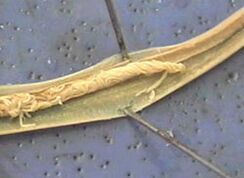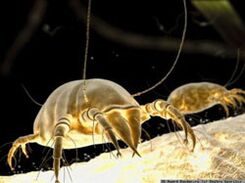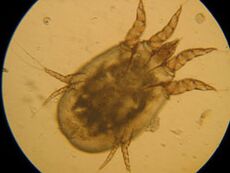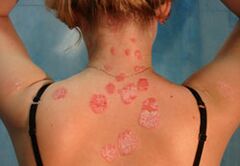Many people live a healthy lifestyle due to the presence of parasites and suffer from health barriers.Emphasizing the body (proper nutrition, physical exercise, sclerosis procedures) without eliminating the body from the parasite will not have obvious positive effects.According to the World Health Organization, worms are not only localized in the gastrointestinal tract, but also in important organs: brain, heart, lung, liver, kidney.During their lives, worm molecules distinguish special substances – strong poisons and allergens.It is the simplest trigger mechanism for many chronic diseases, fungi and worms.

Chronic fatigue, irritability and anxiety, ADHD in children, anemia, brittle nails and hair, problematic skin, headaches, appetite disorders, reduced immunity – these may be signals of current illness.Parasites exist in the human body for a long time and the immune system suffers a lot.It is exhausted in the process of continuous struggle with foreign antibodies, i.e. the development of secondary immune deficits.Diseases with parasites lead to degradation, depletion of microelements: potassium, copper, manganese, selenium, zinc, magnesium, silicon; violation of hematopoiesis, hormone failure, vascular permeability is violated, preventing human cancer protection.
For thousands of years, people have been mainly plant foods and have received natural active substances for antibacterial, antiparasitic and antiviral drugs.Consumption of wild plants, fruits, berries, alternative vegetables and fruits is reduced, and heat and industrial treatments lead to reduced consumption of natural volatiles and antibiotics.As a result, a person becomes prone to many microorganisms.The intensive development of antibiotic-producing pharmaceuticals leads to reduced immunity.
Parasite determination

Parasite (from Palacitos, Greece - an overlapping, parasite) - Plants and animal creatures (owners) living outside or inside another organism (owners) and feed at his cost.Parasites are generated during the historical development of organisms in free-living forms.Their adaptation to certain living conditions requires simplifying the development of their tissues, the development of special fixed organs, and the development of reproductive organs, which makes it possible to exist in uneasy environments.Parasites include many worms, fungi, viruses, protozoa, worms, crustaceans, spider-shaped, insects.The owner of the parasite can be bacteria, simplest, plants, animals and humans.Parasites undergo a complex development cycle: Sometimes they need to change 2-3 owners whose bodies are intermediates (worms pass through the larval stage) or eventually (worms become mature, invasive).Parasites can cause weakening and depletion of the host, causing a variety of diseases.
The helmsman can parasitize in all a person’s tissues and organs, but the most common location is the food area.Bulls and pork tape, wide tape fixed in the upper small intestine, also makes Ascalis parasitic.The dwarf tabell is mainly located in the lower third of the small intestine, Vlasovs - in the large intestine, opistorchis - in the bile channels of the liver and in the pancreas, pinworms, pinworms - in the thin lower parts and all parts of the large intestine.Therefore, in the search for the most favorable living conditions, the distribution of different types of worms provides them with personal survival and creates conditions for several types of development within a person.
Classification
By distribution:
- Pan-like - Meet everywhere.
- Tropical - Distributed in tropical climate zones.
According to biological and epidemiological characteristics: Earth molecule - This disease first develops for the first time in the human body and then on non-living substrates, more commonly on the ground.The biological Hermit is a disease in which biological cycles are bound to occur in other organisms except one person.Distinguishing between the final owner, in the stage when the worm develops to sexual maturity and in the middle owner, the parasite is at the stage of the larvae or its reproduction is not a sexual act.One person is usually the final host, fewer people - intermediate.Connective helminthosis is a disease in which parasites are distinguished from the human body that is mature or almost mature, so infections from others are possible or reinfected by themselves.
Depends on the location of the parasite in the body: education - living in the human gut and other cavity (e.g., assworms, tape) and tissue - living in tissue.

At the owner's residence:
- Exterior (mosquitoes, blinds, water ches, lice).
- Interior (Helminthiasis):
- round worms (nematodes - Ascarid, Vlasov, pinworm, tortuous);
- worm:
- trematodes (discs - cat off-road, schistosomiasis);
- Cestodes (ribbon worms - bull and pork tapeworms, dwarf tabert, wide tape, echinococcus).
- Bacterial diseases (staphylococci, streptococci).
- Myopathy (amoeba, ramblia, caterpillar, usually the owner of Chlamydia and HIV).
- mycoses (fungal diseases) - for example, Candida.
How parasites adapt
- Long-term life expectancy (worms have lived in the body for many years, sometimes as many as the owners of parasites);
- The ability to inhibit or modify the immune response in the host (an immune deficiency state emerges, creating conditions for the pathogenic agent to penetrate from the outside and restore the internal focus of infection);
- Many types of worms, entering the digestive tract, distinguishing against enzymes, prevent them from dying.The digestive process is disturbed, toxic allergic reactions with different gravity: urticaria, bronchial asthma, atopic dermatitis;
- development stage (egg, larvae, owner change);
- The ability of eggs to persist in external environments for many years;
- The sexual reproduction of genetic information is being exchanged, which is the highest stage of development, leading to the increase of heterogeneous populations, i.e., parasites become less fragile.
- Because the immune response is weak and unstable, there is no immune protection method.
- Worms are extensive and many habitats (water, soil, air, flora and fauna).
How parasites enter the body

You can not only get infected by dirty hands.Animal hair is the vector of Ascaride in Lamblia.The eggs of pinworms dropped from the wool can still survive for 6 months and fall into the food area through dust, toys, carpets, underwear and bedding, as well as hands.Dogs breathing through wet dispersing eggs at a distance of 5 meters (cats - up to 3 meters).Dogs' fleas also tolerate worm eggs.Askarid eggs are also spread to the flies by washing poorly with vegetables, fruits, berries, greens, dirty hands.And cooked barbecue or homemade lard is the path to trichomoniasis infection.Salted fish, caviar - lymycotics and wide tape.
Therefore, there are several ways to get into the body:
- Consumption (through infected food, water, dirty hands);
- Contact the family (via household goods, infected family members, pets);
- insects passing through blood;
- Active (When bathing in an open reservoir, larvae penetrate the skin or mucous membranes when in contact with infected soil).
prevention
Here are some rules to follow to prevent parasites from infiltration into the body:
- Drinking water from natural sources and unfamiliar areas is not recommended.
- You cannot eat unwashed vegetables and fruits.
- It is recommended that you beware of mosquitoes, ticks and other bloody insects that can be parasite carriers.It is necessary to use special protective measures to prevent them, in many places, wearing long sleeves, pants and shirts.
- It is necessary to get vaccinated from typhoid fever, plague, tropical heat and other infectious diseases before traveling to certain countries.To go to the place where malaria mosquitoes are found, you need to take anti-powder tablets.Gathering on long trips of tickworms, it is important to get vaccinated from tickworm encephalitis.
- Children are not allowed to hug and kiss dogs, cats and other pets.Take care of your pet's health - take them to deworming classes.
- Follow personal hygiene rules and keep your home clean.
- Regular preventive antiparasitic courses are performed throughout the family.
Children and parasite invasion

Children are most susceptible to parasites.They infect various types of parasites through dirty hands, sand, soil and water.Sometimes, infections in children can occur in uterus, because the simplest are bacteria, viruses, candida and worm larvae that can penetrate the fetus with blood flow and during the birth of the birth channel.As their sports activities expand, at the age of 1.5-3, children in kindergarten can be exposed to contaminated objects on the street (street shoes, floors, toys, public areas), on the street (playing on sandboxes or grounds), and on the street (homemade on the street or on the street).The possibility of parasite invasion is observed is high and does not comply with hygiene rules (not washing hands, eating unwashed vegetables and fruits, eating raw water from natural ponds, and swimming in it).Only the eggs of Pinworms and Dwarf Tapeworm spread directly between people.The eggs used for mature other worms must enter the intermediate host or the appropriate environment - the body of the soil or water.At 1.5-3 years of age, the infection scale of children with germ can reach 80%.
More than 90% of all worm diseases in children are caused by intestinal nematodes, which are parasitic in the intestinal tract (ass bone, pinworm), intestinal wall parasitism or other organs (Ankylostoma (Ankylostoma) (Ankylostoma, nonkylostoma, non-Cicicinella, non-Cicicinella, cicicinella and -cicicinella, cicicinella and -Intestinal uctuma) are parasitic. In children, there are few worms (tremottodes) and tape peristalsis (Cestodes) as long as they receive basic hygiene (meat or fish that are not properly treated or heat treated, unwashed vegetables and fruits, unfolded water from natural reservoirs).
How do children get infected?
When the egg larvae enters the body, an infection occurs.Eggs bring feces from infected people and animals into the environment.They have microscopic sizes, are very resistant to various effects, and can remain viable in the body for a long time (in the soil, on the surface of an object or product, in the flax folds, on the skin).Once inside the child's mouth, the worm egg passes through acidicity, which is destroyed by the aggressive environment of the stomach and is activated in the intestine, where the conditions for developing into a human from the egg are most favorable.Preschoolers and preschoolers are particularly vulnerable to worm invasion because they still imperfect gastrointestinal disorders.
Measures to prevent worm disease in children: Abide by hygiene rules for all family members and try to prevent intimate contact between children and their personal belongings and pets; on the street, it is important to ensure that children do not choose various objects.Prevent contact with animals; it is important to instill your child’s personal hygiene skills (wash your hands with soap on the street and visit the toilet).It is recommended to regularly clean the home with soap toys, especially in front of pets and from walking to the house; vacuum carpets, decorative furniture and upholstered toys; do not give children unwashed vegetables and fruits without enough heat untreated meat and fish, raw water from natural reservoirs.
Signs of worms invading children

Most of the time a child has to guess the worm invasion by indirect signs.The probability of helminthic invasion is very high if the child has such symbols such as: salivation, nausea, decreased appeal or pathological increased, cramping pains around the navel or without certain localization, appearing regardless of food intake, stool disorder (diarrhea, constipation), frequent tidimony or dizziness, pallor and pallor, pallor and pale Sineva under the eyes, increased excitabilityof children in the evening, harmless whimsical, poor sleep, poor sleep, accompanied by screams, awakening, "irritability", grinding teeth, and itchy teeth.Parasites often cause allergies in the body, and skin reactions appear in the form of atopic dermatitis (usually stubborn, which is difficult to treat with symptoms).If worms are found in children or in a family member, it is necessary to treat the entire family to avoid forming the focus of infection.In this case, it is important to strengthen hygiene measures, especially bedding and personal underwear on both sides.

























